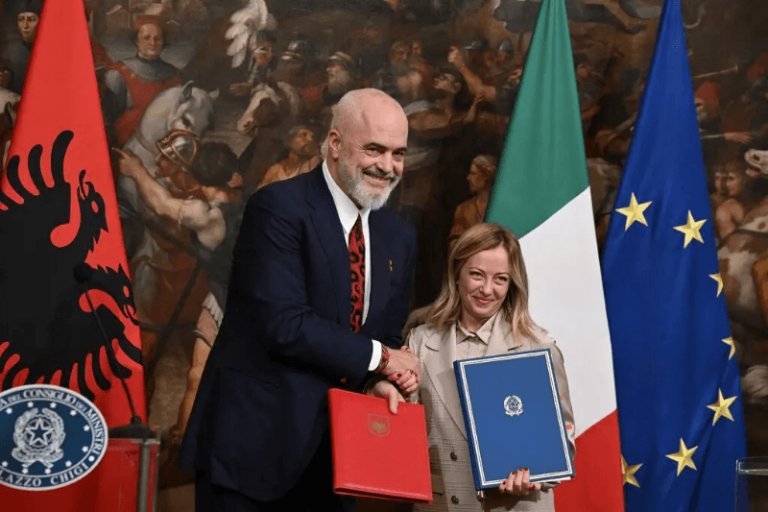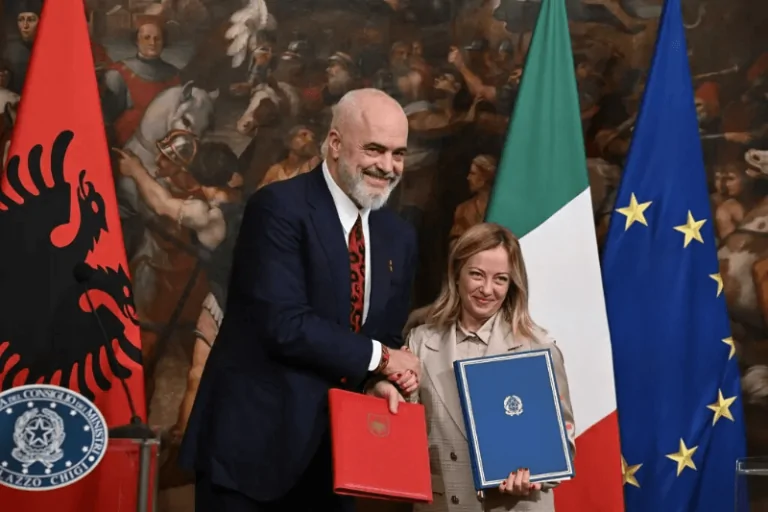

image 800x533 (51)
Italy’s far-right administration on Monday passed a new law aimed at addressing judicial obstacles that might jeopardise a controversial migration agreement with Albania.
With this immediate law, the government has narrowed the list of countries classified as “safe” by law, allowing Rome to quickly send back those migrants who have not secured asylum.
The count of safe countries has decreased from 22 to 19, now omitting Cameroon, Colombia and Nigeria.
This decision follows a ruling by judges in Rome, who on Friday sent their first 12 migrants to a newly established reception centre in Albania, asserting that their countries of origin, Bangladesh and Egypt, were not felt safe enough to send them back.
Following the decision, all 12 migrants were sent back to Italy, where they are eligible to reapply for asylum.
A recent verdict by the European Court of Justice, which declared that a country can only be recognized as safe for sending back to their countries if its entire region is considered secure, served as the foundation for the judges’ decision in Rome.
This ruling presented an early challenge to the five-year agreement between Italy and Albania for Tirana to accommodate 3,000 migrants per month who are rescued in international waters by the Italian coast guard.
These migrants will either undergo a process for potential asylum in Italy or be returned to their home countries.
Italian Prime Minister Giorgia Meloni has advocated for the agreement, promoting it as a new “model” for managing illegal migration.
Meloni criticised the decision made by judges in Rome as “prejudicial” and promised to eliminate any judicial obstacles.
Human rights organisations and NGOs working in the Mediterranean have criticised the Italy-Albania pact as a harmful precedent that goes against international laws.
Legal experts also pointed out that the new law sanctioned by the Meloni administration might not be sufficient to resolve future conflicts as EU rulings take precedence over clashing national legislation.
Interior Minister Matteo Piantedosi on Monday dismissed the criticism, asserting that the new law aligns with the European Court of Justice’s ruling and complies with a new EU regulation set to come into effect in 2026.
The U.S.-based driver training company Zutobi analyzed road safety worldwide and found South Africa stays last in driving danger since…
The Basketball Africa League (BAL) returns for its 2025 season with exciting changes and developments. Since 2019 the NBA-linked basketball…
The Somali president supports their military forces to eliminate the threats from Al-Shabaab, ISIS, and Al-Qaeda. The Somali National Army…
UAE President Sheikh Mohamed bin Zayed Al Nahyan held talks with President Faustin Archange Touadéra of the Central African Republic…
African football teams struggle intensely in the World Cup Qualification rounds to earn their place on the international football stage.…
The journey toward the 2026 FIFA World Cup is rapidly intensifying for all African teams, who now hold a historical…
This website uses cookies.